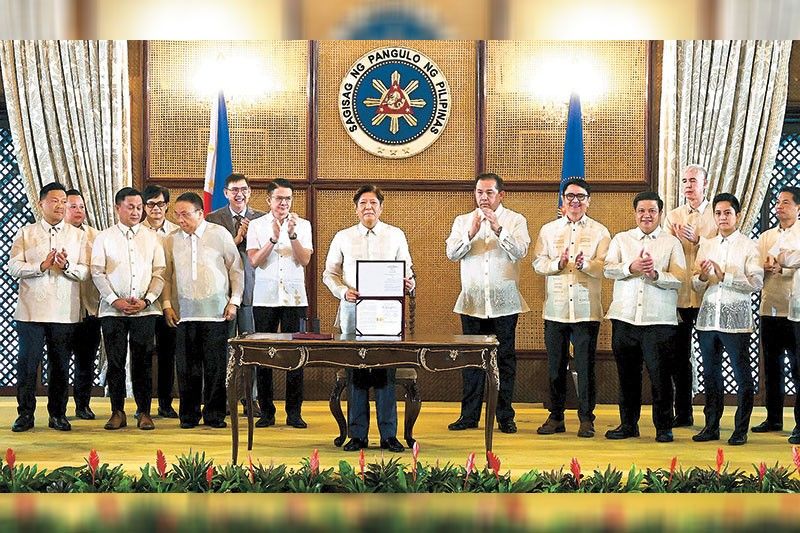Marcos signs law creating Negros Island Region

MANILA, Philippines — President Marcos yesterday signed into law a bill establishing the Negros Island Region (NIR) and called on lawmakers to pass more “inclusive, responsive and people-centered” bills this year.
Republic Act 12000, enacted into law by Marcos, creates the Negros Island Region unifying the provinces of Negros Occidental, including Bacolod City, Negros Oriental and Siquijor.
The measure aims to promote administration decentralization, strengthen local autonomy and accelerate economic, cultural and social development.
“This union is long overdue and makes very practical sense, especially in the Negros Island, where people are located on one island but are governed under separate administrative regions,” the President said.
“So, for decades now, Negrenses have endured the rigors of sea travel, unnecessary expenses, bureaucratic red tape, [and] inefficiency that this arrangement has brought, especially when there is a need to urgently access government services from regional centers on other islands,” he added.
“To our fellow workers in both the houses of Congress, I implore that before the year ends ..that laws which are more inclusive, responsive, and people-centered to be passed. And we are deep in discussion about that,” Marcos also said.
“Our people are eagerly awaiting the passage of the 17 priority bills certified by LEDAC (Legislative Executive Development Advisory Council) – which we will be discussing very soon – which if passed and enacted, will steer our national development and improve the conditions of our fellow countrymen. So, let’s continue to collaborate and work closely on these matters.”
During the fourth LEDAC full meeting in March, officials from the executive branch and legislators agreed to prioritize the passage of 20 bills by the end of June.
Former Senate president Juan Miguel Zubiri said RA 12000 would bring a “wave of development” to the new region.
“The NIR has long been a dream of mine and of my fellow Negrenses,” said Zubiri, whose paternal family hails from Kabankalan, Negros Occidental.
“We have long wanted to have our own region, with our own government offices readily accessible to our people,” he added.
Prior to the signing of the NIR Act, Negros Occidental was part of Region 6, while Negros Oriental and Siqujior were under Region 7.
The previous administrative setup had long been considered costly and inconvenient by residents of the three provinces, who had to travel to Iloilo and Cebu in order to transact with their respective regional government offices, Zubiri said.
“With the NIR, we will be able to bring the government closer to our people, be able to attract more investors to come to the region, since the merging into one administrative region is set to improve our ease of doing business,” he pointed out.
The NIR was initially established in 2015, through an executive order issued by then president Benigno Aquino III. However, it was abolished by his successor, Rodrigo Duterte in August 2017, allegedly due to funding issues.
With the new NIR law, Negros Occidental Gov. Eugenio Jose Lacson said “there is so much to be done,” particularly the setting up of regional offices and the Regional Development Council.
Metro Bacolod Chamber of Commerce executive officer Frank Carbon hailed the signing of the NIR, calling it “a boon for business.”
Carbon also said creation of the new region would enhance inter-provincial road connectivity and upgrade Negros Island’s airports and seaports. He also said the new setup would have a “positive domino effect” on power generation and transmission, as well as on development of water sources.
Negros Occidental 3rd district Rep. Jose Francisco, who co authored the NIR bill, said the newly enacted measure would facilitate integrated planning toward inclusive, resilient and sustainable development in the region. – Gilbert Bayoran
- Latest
- Trending




























